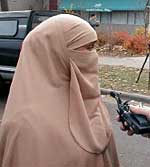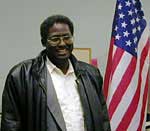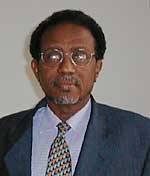By Brandt Williams
Minnesota Public Radio
February 5, 2002
|
| RealAudio |
There are more Somalis in Minnesota than any other African immigrant group. Like nearly all newcomers to America, Somalis have faced racial and ethnic discrimination in their new surroundings. That reality comes as no surprise to African-Americans who have experienced racism all their lives. It is particularly troubling to members of both Somali and African-American communities that occasional cultural clashes have erupted between members of the two groups.
| |
|
|
|
||
A group of Somali and African-American teenage boys meet everyday at Roosevelt High School in Minneapolis. Their group is called Brothers of the Ankh.
At the beginning and end of each session, group leaders Wesley Smith and Nate Hurse gather the young men into a circle and lead them in African-style rituals.
As this morning's meeting concludes, Wesley Smith rallies the 12 young men around a goal for the day. They all put their hands in a circle, like football players before a big game.
"Respect for Self, on three. One, two, three, RESPECT FOR SELF!" the group shouts.
The group was formed by a non-profit educational organization called the We Win Institute. The institute helps African-American children excel in school and in life, by using lessons steeped in the traditions of African cultures. The group also tries to build a bridge between African-American and Somali students.
"Here at Roosevelt we want them to get reconnected so they can work better with the Somalian population - realizing there's no difference between us. It's just that one of the links in the chain has been broken," says Nate Hurse.
To fix those broken links between African-American and Somali kids, Hurse's group put together a newsletter featuring essays and poems.
One of the essays is by Ismail Mohamed. He writes about being beaten up by several African-American students. Mohamed says he was accused of breaking another African-American student's leg.
| |
|
|
|
||
He says he didn't do it and writes, "I just want to say that I am sorry about any misunderstanding that has happened between me and any of my African-American brothers and sisters. I think that I should be able to walk down the hall without being mugged by the young men that jumped me. I have no bad feelings. I just want us to get along and become friends."
There are about 500 Somali students at Roosevelt, and there have been frequent fights between African-Americans and the Somali kids.
Hurse says he's heard African-American students say they just don't like Somalis. But he says there's a lot African-Americans don't understand about the Somalis and themselves.
"They don't understand that culturally, they have not been influenced by European thinking as much as African-American students have, historically, as well as myself," says Hurse. "They know more of their history, they know more who they are. They are comfortable being who they are."
Last spring, several hundred Somali students gathered after school in the lunchroom for a celebration to mark the end of the school year.
Nearly all the girls in the room are wearing some form of traditional clothing. Some wear just a head scarf with jeans and a t-shirt. Most are covered head to toe in long, flowing garments. The boys dress more like African-American boys, though most of them have forgone the baggy pants look. The boys sit in the front of the room, the girls toward the back.
Roosevelt senior Abdi Rahman says anger directed at Somalis comes from ignorance of their religion - Islam - and culture, especially its rules about how girls conduct themselves.
|
"They think because we cover our hair or we do different things from them, we are different."
- Nimco, a Somali student at Roosevelt High School |
"It's our culture and our religion that she's not supposed to shake hands with boys," says Rahman. "So sometimes they get offended - they think they don't like them and that's why they don't want to shake hands. But it's our culture and our religion."
"They think because we cover our hair or we do different things from them, we are different," says Nimco, who is also a senior and a Somali.
She says Somali girls are not allowed to date non-Somalis, which can sometimes cause hard feelings. And Nimco says there isn't enough time to teach others about cultural differences.
"Basically we're all humans, but basically they don't understand that. As a student, we don't have the time to explain that, because we have classes in between seven minutes every day, and those seven minutes you cannot explain to anyone what is going on," Nimco says.
At Lucille's Kitchen in Minneapolis, Somali and African-American adults come together at the Insight KMOJ Public Policy Forum. The forum combines live music, community news and vigorous political debate.
Somali leaders frequently come to Lucille's to talk about issues and to deliver announcements in Somali.
Moussa Ali makes an announcement about fighting that has erupted back in Somalia between two clans. He says representatives from the clans will try to meet in another part of Somalia to find a solution to the conflict.
| |
|
|
|
||
Like everyone else in the U.S., Somalis have felt the impact of the events of Sept. 11. But, unlike other Americans, Somalis have felt singled out in America's war on terrorism.
Several money-wiring services used by Somalis to get funds home to their relatives were closed, because federal officials discovered that terrorist groups were skimming money from them.
Somalis have also reported being the targets of racial and ethnic slurs and even violence. In October, a Somali man was assaulted by a white man, and later died in the hospital.
But some say African-Americans haven't jumped on that bandwagon.
"My feeling is that since Sept. 11, the African-American community has been very supportive of the Somalis," says Saheed Fahia, the director of the Confederation of Somali Communities of Minnesota. He is also a frequent guest at the Lucille's Kitchen forum.
Fahia says generally, African-Americans sympathize with Somalis.
"They understand what it means to be looked down on and discriminated against. So I think that's what makes the difference," he says.
Fahia says Somali community leaders and African-American community leaders have established a solid working relationship. He says conflicts still arise between African-Americans and Somalis, but insists those incidents are often blown out of proportion by the media.
More from MPRMore Information



